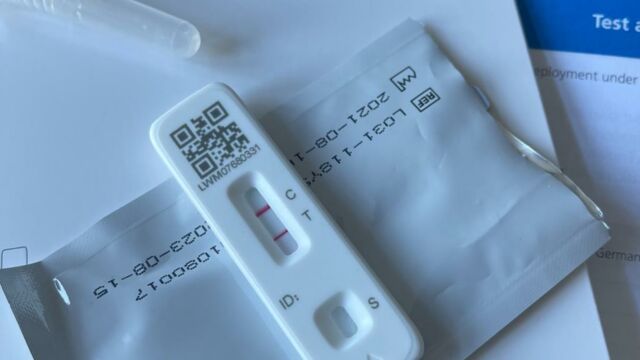Experts have recommended that while performing Lateral Flow Tests (LFTs), patients should swab both their throat and nose since anecdotal data suggests that nasal samples alone may be less successful at finding positive cases of Omicron. This comes after hundreds of patients have reported negative LFT results after swabbing their nasal passages.
Discover our latest podcast
Although, they have received a positive PCR test result. After witnessing the increasing findings experts have been trying to get a sense of what exactly is going on.
Slower to detect the infection
According to a new real-world study, even after their first positive PCR result, people may wait an average of three days to test positive on a nasal-based LFT. Experts believe this is because the virus grows faster in the throat than in the nose, making it easier to detect. PCR tests require samples from both the nose and the back of the throat, although certain LFTs simply require a nasal swab.
In the initial stages of the virus, especially Omicron, the infection would replicate first in the throat and then the nose. An epidemiologist at University College London, Prof Irene Petersen adds further:
To me, it seems as though some people may have an infection in their throat before they get an infection in their nose.
It seems a question about how Omicron establishes itself in your body and that appears to be different than previous variants.
She went on to say that the fact that many people reported sore throats as one of the early signs of the variant could be connected.
You want to catch the virus as early as possible, but that may be from your throat rather than your nose.
Nasal and throat swabs
As a result, it is advised to take samples from both the nose and throat even if people are not instructed to do so. Professor Tim Spector, the Lead scientist on Zoe Covid Study, agreed with the same and told people earlier this week:
As well as knowing about cold-like symptoms – always swab both your throat as well as your nose if you want an accurate LFT.
The gap in accuracy between just nasal and nasal and throat swabs may lead to many people feeling they are not sick when they are. However, just nasal swabs may not be an issue for those trying to come out of their isolation, Prof Petersen added:
When you are really infectious you have millions of copies of the virus in different tissues in your body, and nasal swabs should be able to pick this up.
It may be less of a problem at the other side of infection than at the beginning. Most people would not be infectious after seven days.
It is still very crucial to continue testing with LFTs regularly. She emphasised the importance of continuous testing with LFTs regularly. In practice, this means that people who have the variation may not have enough viral load to test positive in the morning but will be infectious by evening.















